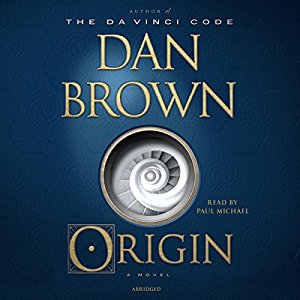Why do I keep doing this to myself?
God help me… I’ve always been a fan of Dan Brown’s type of stores, the puzzles, the history, and the chase to solve the mystery or gain the ultimate knowledge first. That being said, Brown’s love-hate relationship with the English language drives me crazy. And when I say hate, I’m not referring to a strong dislike.
No, no… Brown demonstrates his hatred of the English language, much in the way an Irish gang-member might demonstrate it, by tying it to a tree, shooting it in the gut and then smiling and softly chuckling as he watches it slowly bleed out.
But then again, who am I to cast judgement?
Origin is the fifth book to feature Robert Langdon, Brown’s Harvard professor of religious symbology. After facing down every conspiracy theorist’s top ten villains, the Freemasons, the Catholics, the uber wealthy to name a few, the story has him facing peril again from the Church, the Spanish Government, and possibly an A.I. created by his old pupil.
In every one of Brown’s books, Langdon goes after some lofty bit of knowledge that’s destined to change the world. This book is no exception.
Summoned to the Guggenhein Museum Bilbao to attend an event where his former student, Edmond Kirsch plans to announce a recent discovery that will alter our perception of the world, our future, and organized religion. Needless to say, Kirsch is killed and the hunt is on for his Earth-shattering discovery.
I’m not going to go into details about what follows. Instead, I’ll say this about the story as a whole. I loved every bit of it, up to the closing. The ending left me unsatisfied and I found most of the revelations, predictable. While using a magnifying glass on the writing, word choices, and Brown’s particular style will show a lot of flaws, the story is fun to read, moves at a good pace, and gives the reader a good feel of the environment Langdon is moving through.
This is a far cry from the last book in the series, Inferno, where Brown did his best to cram everything about Daunte’s Inferno into a mysterious chase across Florence. A chase which felt more like reading a tour guide to the city rather than a painfully bad mystery.
Brown’s first two books in the series, Angels & Demons and The Da Vinci Code, had reasonably good and satisfying ending. The Lost Symbol did not and Inferno was just a train wreck. The reader should take the ending for what it is, not a perfect wrap-up to the mystery, but something to make you think and speculate with like-minded friends.

